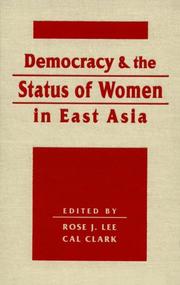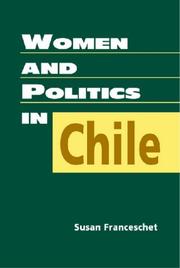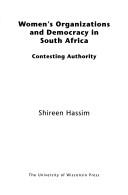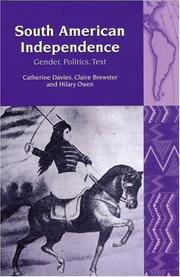| Listing 1 - 10 of 12 | << page >> |
Sort by
|
Book
ISBN: 0801896746 9780801896743 9780801895791 0801895790 9780801890086 080189008X Year: 2008 Publisher: Baltimore Johns Hopkins University Press
Abstract | Keywords | Export | Availability | Bookmark
 Loading...
Loading...Choose an application
- Reference Manager
- EndNote
- RefWorks (Direct export to RefWorks)
Despite a late and fitful start, democracy in Africa, Latin America, and Eastern Europe has recently shown promising growth. Kathleen M. Fallon discusses the role of women and women's advocacy groups in furthering the democratic transformation of formerly autocratic states.Using Ghana as a case study, Fallon examines the specific processes women are using to bring about political change. She assesses information gathered from interviews and surveys conducted in Ghana and assays the existing literature to provide a focused look at how women have become involved in the democratization of sub-Saharan nations. The narrative traces the history of democratic institutions in the region -- from the imposition of male-dominated mechanisms by western states to latter-day reforms that reflect the active resurgence of women's political power within many African cultures -- to show how women have made significant recent political gains in Ghana and other emerging democracies. Fallon attributes these advances to a combination of forces, including the decline of the authoritarian state and its attendant state-run women's organizations, newly formed constitutions, and newfound access to good-governance funding. She draws the study into the larger debate over gendered networks and democratic reform by exploring how gender roles affect and are affected by the state in Africa, Latin America, and Eastern Europe. In demonstrating how women's activism is evolving with and shaping democratization across the region, Democracy and the Rise of Women's Movements in Sub-Saharan Africa reveals how women's social movements are challenging the barriers created by colonization and dictatorships in Africa and beyond.
POLITICAL SCIENCE --- Political Ideologies / Democracy --- Women and democracy --- Women --- Gender & Ethnic Studies --- Social Sciences --- Gender Studies & Sexuality --- Human females --- Wimmin --- Woman --- Womon --- Womyn --- Females --- Human beings --- Femininity --- Democracy and women --- Democracy --- Political activity --- Social conditions --- Women in politics --- Social conditions. --- Africa, Sub-Saharan --- Politics and government

ISBN: 1107192161 1283528843 9786613841292 113912174X 1139126660 1139113836 1139111647 1139116002 1139106678 9781139126663 0521591546 9780521591546 0521598435 9780521598439 9781139106672 9781107192164 9781283528849 6613841293 9781139113830 9781139111645 9781139116008 Year: 2000 Publisher: Cambridge ; New York : Cambridge University Press,
Abstract | Keywords | Export | Availability | Bookmark
 Loading...
Loading...Choose an application
- Reference Manager
- EndNote
- RefWorks (Direct export to RefWorks)
Feminist analysis shows that the prevailing concepts of citizenship often assume a male citizen. How, then, does this affect the agency and participation of women in modern democracies? This insightful book, first published in 2000, presents a systematic comparison of the links between women's social rights and democratic citizenship in three different citizenship models: republican citizenship in France, liberal citizenship in Britain, and social citizenship in Denmark. Birte Siim argues that France still suffers from the contradictions of pro-natalist policy, and that Britain is only just starting to re-conceptualise the male-breadwinner model that is still a dominant feature. In her examination of the dual-breadwinner model in Denmark, Siim presents research about Scandinavian social policy and makes an important and timely contribution to debates in political sociology, social policy and gender studies.
Women and democracy --- Women's rights --- Feminism --- Emancipation of women --- Feminist movement --- Women --- Women's lib --- Women's liberation --- Women's liberation movement --- Women's movement --- Social movements --- Anti-feminism --- Democracy and women --- Democracy --- Political aspects --- Emancipation --- Femmes et démocratie --- Femmes --- Féminisme --- Droits --- Aspect politique --- Social Sciences --- Sociology
Book
ISBN: 1280772719 9786613683489 9004229914 9789004229914 9789004224254 9004224254 9781280772719 6613683485 Year: 2012 Publisher: Leiden Boston
Abstract | Keywords | Export | Availability | Bookmark
 Loading...
Loading...Choose an application
- Reference Manager
- EndNote
- RefWorks (Direct export to RefWorks)
Whilst scholarship on women’s suffrage usually focuses on a few emblematic countries, The Struggle for Female Suffrage in Europe casts a comparative look at the articulation of women’s suffrage rights in the countries that now make up the political-unity-in-the-making we call the European Union. The book uncovers the dynamics that were at play in the recognition of male and female suffrage rights and in the definition of male and female citizenship in modern Europe. It allows readers to identify differences and commonalities in the histories of women’s disenfranchisement and sheds light on the role suffrage has played in the construction of female citizenship in European countries. It provides the background against which a new European paradigm of parity democracy is gradually asserting itself.
Women --- Women and democracy --- Citizenship --- Birthright citizenship --- Citizenship (International law) --- National citizenship --- Nationality (Citizenship) --- Political science --- Public law --- Allegiance --- Civics --- Domicile --- Political rights --- Democracy and women --- Democracy --- Human females --- Wimmin --- Woman --- Womon --- Womyn --- Females --- Human beings --- Femininity --- Suffrage --- History. --- Political activity --- Law and legislation
Book
ISBN: 1442619112 9781442619111 9781442648968 1442648961 1442619120 Year: 2015 Publisher: Toronto
Abstract | Keywords | Export | Availability | Bookmark
 Loading...
Loading...Choose an application
- Reference Manager
- EndNote
- RefWorks (Direct export to RefWorks)
Femocratic Administration examines the gendered nature of public administration through a study of the Ontario Women's Directorate (OWD) between 1985 and 2000.
Feminism --- Women --- Women and democracy --- Democracy and women --- Democracy --- Human females --- Wimmin --- Woman --- Womon --- Womyn --- Females --- Human beings --- Femininity --- Emancipation of women --- Feminist movement --- Women's lib --- Women's liberation --- Women's liberation movement --- Women's movement --- Social movements --- Anti-feminism --- Political aspects --- Government policy --- Emancipation --- Ontario --- Politics and government.


ISBN: 1626373272 9781626373273 1555878881 Year: 2022 Publisher: Boulder
Abstract | Keywords | Export | Availability | Bookmark
 Loading...
Loading...Choose an application
- Reference Manager
- EndNote
- RefWorks (Direct export to RefWorks)
Though modernization and democratization have benefited many women in developing countries, capitalist development has often reproduced patriarchal roles and stereotypes. This collection examines how the processes of modernization and democratization have affected women in East Asia.
Women and democracy --- Women --- Women's rights --- Patriarchy --- Androcracy --- Patriarchal families --- Fathers --- Families --- Male domination (Social structure) --- Patrilineal kinship --- Human females --- Wimmin --- Woman --- Womon --- Womyn --- Females --- Human beings --- Femininity --- Democracy and women --- Democracy --- Rights of women --- Human rights --- Political activity --- Government policy --- Civil rights --- Law and legislation --- Legal status, laws, etc.

ISBN: 162637161X 9781626371613 1588263169 9781588263162 Year: 2005 Publisher: Boulder (Colo): Lynne Rienner,
Abstract | Keywords | Export | Availability | Bookmark
 Loading...
Loading...Choose an application
- Reference Manager
- EndNote
- RefWorks (Direct export to RefWorks)
Why have women remained marginalized in Chilean politics, even within a context of democratization? Addressing this question, Susan Franceschet traces women's political activism in the country—from the early twentieth century struggles for suffrage to current efforts to expand and deepen the practice of democracy. Franceschet highlights the gendered nature of political participation in Chile, as well as changing perceptions of what is and is not political. Even as women enter electoral and bureaucratic politics in greater numbers, she argues, they are divided by ideology, competing interests, and unequal access to power. Clarifying the themes and challenges of the Chilean women's movement today, she finds an inextricable link between women's struggles for citizenship rights and the nation's broader struggles for democracy and social justice.
Women --- Women and democracy --- Feminism --- Democracy and women --- Democracy --- Human females --- Wimmin --- Woman --- Womon --- Womyn --- Females --- Human beings --- Femininity --- Political activity --- History. --- Chile --- Politics and government. --- Femmes --- Femmes et démocratie --- Féminisme --- Activité politique --- Chili --- Politics and government --- Politique et gouvernement --- Women in politics --- History --- Chile - Politics and government. --- Women in politics - Chile - History --- Women and democracy - Chile --- Feminism - Chile

ISBN: 1282269992 9786612269998 0299213838 9780299213831 0299213803 9780299213800 0299213846 9780299213848 9781282269996 6612269995 Year: 2006 Publisher: Madison : University of Wisconsin Press,
Abstract | Keywords | Export | Availability | Bookmark
 Loading...
Loading...Choose an application
- Reference Manager
- EndNote
- RefWorks (Direct export to RefWorks)
Women --- Women and democracy --- Feminism --- Gender Studies & Sexuality --- Gender & Ethnic Studies --- Social Sciences --- Human females --- Wimmin --- Woman --- Womon --- Womyn --- Females --- Human beings --- Femininity --- Emancipation of women --- Feminist movement --- Women's lib --- Women's liberation --- Women's liberation movement --- Women's movement --- Social movements --- Anti-feminism --- Democracy and women --- Democracy --- Political activity --- Societies and clubs --- Emancipation --- Femmes --- Femmes et démocratie --- Féminisme --- Societies and clubs. --- Activité politique --- Associations --- South Africa --- Afrique du Sud --- Politics and government --- Politique et gouvernement

ISBN: 1282863738 9786612863738 0773573127 9780773573123 0773529934 9780773529939 0773529535 9780773529533 9781282863736 6612863730 Year: 2005 Publisher: Montreal [Que.] McGill-Queen's University Press
Abstract | Keywords | Export | Availability | Bookmark
 Loading...
Loading...Choose an application
- Reference Manager
- EndNote
- RefWorks (Direct export to RefWorks)
Filling a void in feminist studies of women and war, Women in Zones of Conflict challenges the traditional view, which suggests a natural connection between women and pacifism, based on the feminine qualities of caring, cooperation, and empathy. Feminist studies of nationalism also envision women as either victimized by patriarchy within nationalist movements or as adopting masculine qualities to conform to the culture of their male compatriots. Jacoby takes an alternative approach, considering how women are situated across the political spectrum. She argues that when categories other than gender - such as class, ethnicity, religion, and political perspective - are considered, there is no single perspective on what it means to be a woman in conflict.
Women in politics --- Women and democracy --- Sex discrimination against women --- Women and war --- War and society --- Society and war --- War --- Sociology --- Civilians in war --- Sociology, Military --- War and women --- Women and the military --- Discrimination against women --- Subordination of women --- Women, Discrimination against --- Feminism --- Sex discrimination --- Women's rights --- Male domination (Social structure) --- Democracy and women --- Democracy --- Social aspects --- Women --- Political activity --- Human females --- Wimmin --- Woman --- Womon --- Womyn --- Females --- Human beings --- Femininity --- 5.225.
Book
ISBN: 1498503209 0739190261 9780739190265 9780739190258 0739190253 9781498503204 Year: 2014 Publisher: Lanham, Maryland
Abstract | Keywords | Export | Availability | Bookmark
 Loading...
Loading...Choose an application
- Reference Manager
- EndNote
- RefWorks (Direct export to RefWorks)
This book examines the role of women involved in South Korea's democratization movement. Through its study of older women and the gender roles and values of Korean society manifested in the "Mothers" movement, this book challenges social movement theories that focus on those on the front line but ignore those behind the scenes.
Women --- Women and democracy --- Protest movements --- Social movements --- Democratization --- Democratic consolidation --- Democratic transition --- Political science --- New democracies --- Democracy and women --- Democracy --- Political activity --- Korea (South) --- Politics and government --- K9327 --- K9300.80 --- K9500.80 --- K9309 --- Korea: Communities, social classes and groups -- gender roles, women, feminism, men --- Korea: Social sciences -- social and cultural history -- modern period, postwar period (1945- ) --- Korea: Politics -- history -- modern period, postwar period (1945- ) --- Korea: Social sciences, society -- social theory, movements and protests

ISBN: 9781846314117 1846314119 9781846310270 184631027X 9781781387979 1781387974 9781846310270 184631027X 1846316847 9781846316845 Year: 2006 Publisher: Liverpool Liverpool University Press
Abstract | Keywords | Export | Availability | Bookmark
 Loading...
Loading...Choose an application
- Reference Manager
- EndNote
- RefWorks (Direct export to RefWorks)
The struggles for independence in Latin America during the first half of the nineteenth century were accompanied by a wide-ranging debate about political rights, nationality and citizenship. In South American Independence, Catherine Davies, Claire Brewster and Hilary Owen investigate the neglected role of gender in that discussion. Examining women writers from Brazil, Argentina, Chile, Peru, and Colombia, the book traces the contradictions inherent in revolutionary movements that, while arguing for the rights of all, remained ambivalent, at best, about the place of women. Through studies of both published and unpublished writings, South American Independence reveals the complex role of women in shaping the vexed ideologies of independence.
Women --- Women and democracy --- Sex role --- Women's rights --- Gender role --- Sex (Psychology) --- Sex differences (Psychology) --- Social role --- Gender expression --- Sexism --- Democracy and women --- Democracy --- Human females --- Wimmin --- Woman --- Womon --- Womyn --- Females --- Human beings --- Femininity --- Rights of women --- Human rights --- Political activity --- History --- Political aspects --- Civil rights --- Law and legislation --- Legal status, laws, etc. --- South America --- Politics and government --- Latin American literature --- History. --- History and criticism. --- Latin America
| Listing 1 - 10 of 12 | << page >> |
Sort by
|

 Search
Search Feedback
Feedback About UniCat
About UniCat  Help
Help News
News